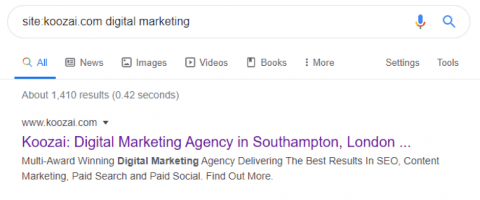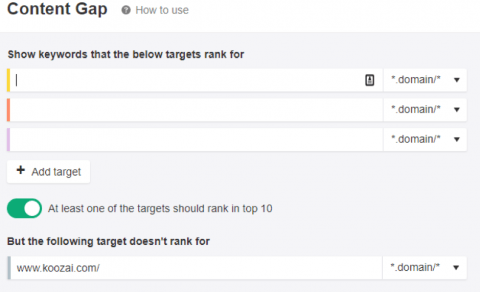Everyone wants to rank for the high-volume keywords, but are they the ones that actually work for you? Looking at organic traffic as a sheer numbers game is archaic in today’s landscape. With continued evolution in search result technology and delivery, you need to be aware of your competitions entire keyword landscape.
The saying “know your enemy” may be a bit on the extreme side, but if you know where your competitors are in search results, you can see where to concentrate your efforts.
Manual Methods
Manual methods may seem counter-intuitive in digital marketing, but machine learning hasn’t gone beyond human intuition and inquisitiveness yet. Here are a few methods which should get you thinking about how users search and will result in some good insights around your competitor keywords.
Using Google to win at Google
There are a number of ways to use Google to help generate new terms and keywords you may have neglected. Here are a couple which can quickly give good results:
Related Search
Everyone has seen the related searches section at the bottom of search results, but have you paid attention to it? These are generated for a reason and, much like the search results themselves, they are aimed at improving user experience. A mixture of relevance and popularity of search terms can result in terms showing here.

If you search a few terms around your competitor you may see some further services and related terms here, giving you a good idea of what popular search terms are.
Autofill
Similar to the above, the terms listed here are designed to be relevant to the user. Personal data and search history may skew this, so it is best to use an incognito browser.

This is good for question and answer terms – blog and advice topics in particular.
Current Winners
One of the best places to start when you want to rank in position 1, check who is already there.
Don’t look at those in position 1 and think you’ll never get there, but instead look at the levels of keywords across these ranking pages and compare this to your own content and optimisation.
This won’t be the only factor in them ranking, but it will ensure that you have the basics covered, letting you move onto technical aspects, link building and brand management.
Competitors Top Pages
Using a little trick in Google, you can see what pages are ranked for different terms on a specific site.
Navigate to Google and put in “site:” followed by the domain you want to check and then type in a search term to see what is most relevant for that term. See below, searching the Koozai site for ‘digital marketing’ and (unsurprisingly), the homepage is the most relevant:

This is most useful for long-tail phrases and finding hidden gems, because usually the high volume, shorter keywords have fairly obvious landing pages – but it can bring up some surprises.
Social Prospecting
If you know your competitors are active on social media you can go through their previous posts and see what they are using for hashtags and connections to other accounts. This can help you see who is active in your industry and can help with future social media plans of your own.

The image above shows a recent post about Google My Business which is seeing an increased share of organic traffic. As well as the #GoogleMyBusiness tag, there are also #GMB and #MyBusiness tags used. Depending on your industry this can shed light on how users search for services and products.
Paid Services
These paid services can be overwhelming with the amount of data, and if you work in digital marketing, you’re probably used them before. Here are a couple of tricks which can help you get the most out of the services outside of the obvious keyword lists.
SEMrush
Under the organic research and then competitors you can see the cross over between the site you enter and your closest competitors. Go one step further and put competitors in to see where the overlap is again. This often gives more insight and helps you pick out the common domains.

Once you’ve identified your competitors you can get on with the daunting task of creating a full keyword landscape. Concentrate on the higher volume keywords (unless you have a few spare weeks!), and you can use this for a good analysis.
This is particularly productive when it is done every six months or so. Combined with visibility graphs it can really show progress across all keywords.
Ahrefs
The competitor data from Ahrefs is comparable to SEMrush, but there is an extra tool which is particularly useful.

The content gap analysis can really help save time in identifying places to concentrate on. Rather than analysing the whole content gap results, you can quickly run through your competitors and just concentrate on the keywords and keyword volume.
Concentrate on the closest competitors who specialise in your industry rather than the larger ‘jack-of-all-trade’ sites which are always listed as competitors (I’m looking at you, eBay). This will give smaller but much more relevant keyword lists to focus on.
Summary
All the data is out there but using it in an efficient way and knowing what is viable and what isn’t is key. If you are still overwhelmed by the competitors and you need help with your digital marketing strategy, get in touch with us today.







Leave a Reply